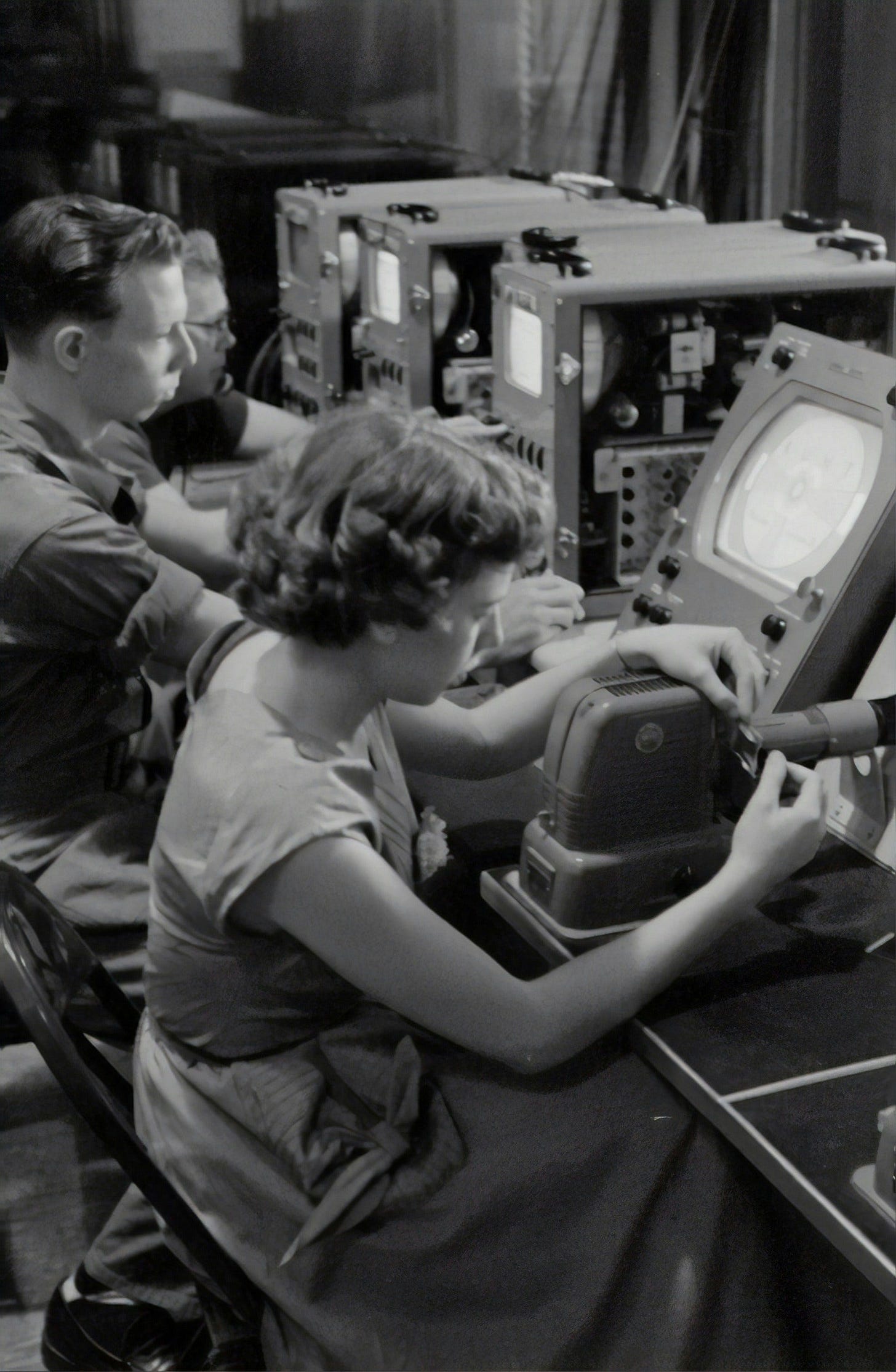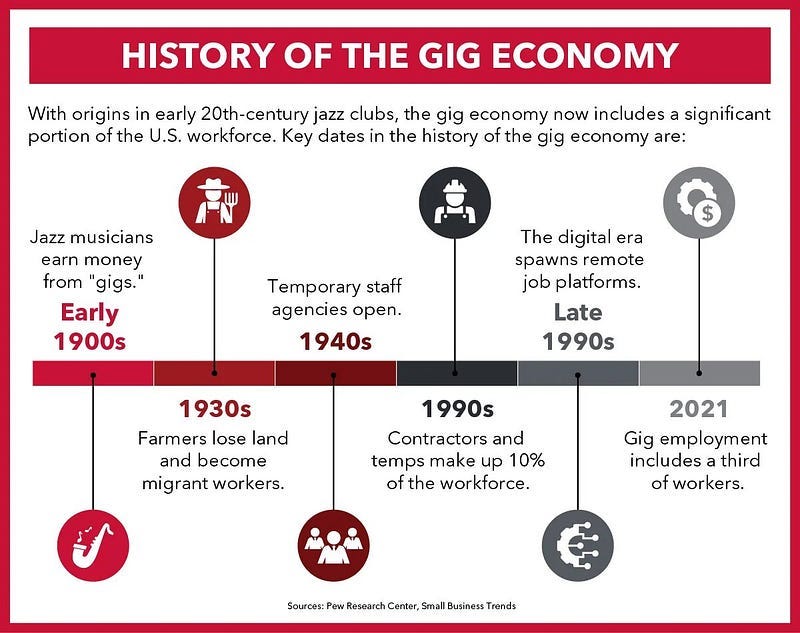The 9 to 5 Is Becoming Extinct — What The Future Of Employment Will Look Like In 2034
The gig economy, micro-entrepreneurship, AI, your digital footprint & the future of work & livelihood

Times are changing at hyperspeed. If Bob Dylan’s song ‘The Times They Are A-Changin” ever held relevance it would be in the morphed-AI generated voice of Chris Cornell singing the song in 2024.
Social media is a double-edged sword; I like to reduce my time doomscrolling (as is the term these days) but we’re all at the mercy of the f*cking algorithm, giving way to something more alarming that economist Yannis Varoufakis calls ‘techno-feudalism’. But every once in a while it does throw up some useful stuff.
I recently came across two thought-provoking & futurist perspectives online, and couldn’t help but dabble in sharing them because of how they could change the very landscape of how we work, earn a living & live life. One was for my industry in ex-Porcupine Tree frontman Steven Wilson’s take on music which I’ll get to later in another post, and the first one was this Twitter(X) thread on the future of work, employment & life.
The 9 to 5 is slowly dying & more people have taken to freelancing, and working remotely & this is the pervading trend of things to come. Not only that but micro-entrepreneurship will also become another stream of income for most people.
“The future of work isn’t just flexible. It’s fluid. You’ll seamlessly shift between employee, freelancer, entrepreneur, and investor. All in a single week.” — says Neal Taparia.
According to Taparia, by 2034 the traditional 9–5 will be extinct (Being a futurist & innovator myself, I’m adding some of my takes along with each point mentioned below).
The Gig Economy & Freelancing
There’s a considerable shift & trend that suggests that people now prefer working separate gigs instead of one, thus creating the gig economy. This is a shift from doing just one job full-time in an office to now freelancing & doing 2 to 3 gigs with the convenience of working remotely or from home.
Not only does this allow convenience, flexibility & work-life balance but it also means you can earn more. But that’s not always the case, for now at least. At the moment, it could take some time for us to see standardised rates for freelancing across industries & job roles & the gig economy providing more income at par or more than just doing a single conventional full-time job.
There’s a simple equation that determines how valuable freelancing will be as we progress into the next decade which is: specialized skills + global demand = premium rates
LinkedIn co-founder Reid Hoffman has also put forth his predictions about the gig economy, which the tweet thread’s author Taparia links in his post (the video at the bottom of the post).
https://x.com/nealtaparia/status/1816133240278901164
In the interview, Hoffman speaks about the emerging gig economy & suggests that not only will people work for 2–3 companies in the form of separate gigs but also across different industries.
Hoffman also suggests that the gig economy creates much more productivity but he is wary about the tradeoff between stability & freedom. One of the challenges we could face in the future is the lack of stability that gigs have to offer.
According to me, one way we can counter that is by ensuring that there’s a sufficient supply of gigs to cater to the demand & also ensuring that contract lengths are longer. Furthermore, normalising working separate gigs & standardised pay packages is also something I envision as time progresses.
With the technology now available at your disposal working from anywhere & working gigs is going to be the future. In my industry which is primarily creative — music & writing — I’ve seen this trend pick up already a decade ahead. I started my writing career in 2015 & have been writing remotely for the best part of my 9+ year career as a journalist/writer with a few conventional office jobs & a couple of start-up ventures sandwiched in between.
In music, which I only began in 2017 & took up seriously since 2020, I see no reason why a Hollywood film score or an album’s production can’t be done remotely on a budget set up in your bedroom studio; sending files back & forth, etc.
Of course, there’ll still be the option & availability of a conventional studio, like say Abbey Road or whatever but a lot of work can be done remotely especially in the lower to medium budget range for those who can’t afford studio spaces or studio time.
Humans Using AI
Humans + AI > Humans w/o AI
Skynet’s impending takeover aside, this is largely apparent. People who use AI in their line work to enhance their productivity & skills are 10x likely to be better at their work than people who don’t use AI.
They’re also going to be faster, more efficient, more productive & less error-prone than the people who are not using AI. AI is here to stay & despite doomsdayers & their own version of the “ides of AI”, it is in fact going to make work quicker & easier across industries.
AI ethics will develop as time progresses, or at least that’s the hope. But a lot of basic work & heavy lifting can be taken out of the daily work process because of AI.
Employers will have to segregate what can be done by AI & what we’re expected to do making it clear at the time of picking up a gig so that we can work along with technology instead of against it.
People need to work in tandem with AI & I guess in time, that’s what we’ll see happening. As is the case with any disruptive technology, there’s always a bit of initial resistance until it becomes mainstream, but that initial apprehension is quite ephemeral.
Your Online Portfolio Or Digital Footprint Will Replace CVs
Another aspect of employment especially relevant for the younger population is the growing trend of CVs & resumes becoming redundant in modern times. Most employers want to see proof of work, in the pudding if you will, and your online portfolio & digital footprint will almost certainly do away with the age-old one-pager.
Also, a lot of companies could move from hiring based on degrees to hiring based on tangible work done by a prospective candidate.
Showcasing your work on a website or your links on LinkTree or on a portfolio displaying platform like Vimeo for film & media or Behance etc., and showing employers proof of your work is something that most companies are beginning to shift towards.
The only barrier is to get enough quality & credible work in your portfolio which for some industries, is a difficult barrier to entry. Personally speaking, I have over 2000+ articles & 2 books as a writer so getting a paid writing gig is pretty easy but in working as a film composer, I’m yet to receive my first IMDb credit, which is why it’s a bit more difficult to land higher-ticket or mid-range gigs, whether it’s a short film or an indie film.
It varies from industry to industry, for example, a GitHub profile with a software project you’ve developed or your Python analytics code which you’ve made yourself is easier to send across than relying on a film producer or director giving you the gig of acting, or any post-production role including the task of scoring his/her film & adding that to your portfolio.
Irrespective, it’s better to create an online page where employers can see all your work & it will certainly make a bigger impression than a PDF document of your CV (at the moment, you can link them in your resume).
In most cases, your work experience is available on Linkedin, so putting everything together, the entire process of scanning through hundreds if not thousands of CVs will slowly be phased out.
Micro-Entrepreneurship
Micro-entrepreneurship is also something that’s on the rise. Call it a secondary stream of income, a side hustle, or whatever you’d like but people are beginning to tap into selling products, and services in the digital e-commerce space.
The shift from the traditional 9–5 to the gig economy is itself apparent & part of being a micro-entrepreneur in that you do gigs by offering your services, but what I’m talking about here is registering on freelance work platforms & picking up additional one-time gigs apart from your contractual obligations.
Some people do only the one-time gigs full-time. But again, the barrier to getting a showcased profile remains a hurdle, but it’s not the most difficult thing.
On the other hand, there are also a lot of people who are selling products whether digital or physical via Amazon or Shopify or wherever.
Personally, I’ve started selling sample packs like this one which I’ve posted on Gumroad (which is the go-to marketplace for buying sample packs for music producers).
Subscribe to Ghost Intent on Gumroad
Multi-genre producer from Mumbai, India. Buy my sample packs here!ghostintent.gumroad.com
Sourcing something & selling it online is becoming something that’s being done by individuals all over the globe. A friend of mine began sourcing and selling slippers but works as a music consultant for an Indian music streaming platform.
It’s this shift to people pivoting to micro-entrepreneurship to add to their income streams that’s also projected to grow significantly over the next decade.
The End Of Office Spaces
Office spaces are becoming more & more of a luxury as compared to a necessity. The cost of having an office is a major detriment & significant cost for any startup.
Commercial office spaces are becoming a thing of the past. No more commuting through traffic, no more cubicles; the culture of working in a massive office is slowly declining. It’s already begun as the market for commercial office spaces in Mumbai is beginning to see a steady decline.
A lot of companies these days have decided against having an office. According to Taparia, “The Death of the HQ is coming, and it’s happening faster than you think: Office space costs will plummet 40% by 2034. GitLab, with 1,500+ employees in 65+ countries, has NO physical office.”
The 15-Minute City Concept

15-minute cities are a newer concept introduced by Professor Carlos Moreno in 2016. Although used mainly in urban planning & architecture, it’s a pretty intriguing concept where he proposes that we create mini 15-minute cities within our large cities.
The idea is that work, nature, healthcare, recreation & all public amenities are situated within a walking or cycling distance of 15 minutes from your residence.
The “future of work is hyper-local & global simultaneously” adds Taparia.
It may seem a bit farfetched but it’s not entirely utopian, and some cities have begun to utilize the concept & put it into practice in their urban planning.
https://x.com/nealtaparia/status/1816133728655270108
What This Means For Companies
The consensus is that for this changing & evolving landscape & the nature of the gig economy, things are shifting towards unchartered territory so what will business owners choose to employ as their policies?
The number of people crying out for remote & flexible work is increasing constantly. So I think employers need to rethink their policies & methods. Expecting full-time work in an office is going to decline rapidly & could become obsolete entirely. As a startup or business owner, how do you position yourself?
I think the attitude of expecting people you employ to work in your office every day needs to change. Hybrid roles are a thing, but going entirely remote is the best way forward.
I think that if the work on offer requires being physically present in an office, site, or set, then it is warranted but unless the work on offer absolutely entails physical presence, work needs to be done remotely as much as it can.
Also, companies must be ready to expect people coming & going in & out the door. Nobody is going to stick around at your company for 5 or more years unless they’re offered significant appraisals. Stats show that employees staying over 5+ years at the same company are significantly declining unless it’s the big five or the likes.
Quality of life & quality of time are being prioritized by the workforce these days, so companies need to shift from their earlier rigid ways by offering remote work. It has its advantages for employers too — a larger workforce to tap into, no office bills, streamlining data & tech, using the funds saved from office expenses to push into marketing, etc.
Furthermore, pay packages need to reflect the growing gig economy trend. Contracts need to be at par & standardised so that people can earn enough doing a particular job role at par with their peers across industries. Although it could take some time, it will lead to a happier & more productive workforce as well.
Some industries pay well in the gig economy too. Hans Zimmer earns millions per film score whether he’s doing Dune, a Nolan film, or an offbeat indie film. So I guess industries all have their own pricing structures & strata from low & medium to high-ticket.
However, being a more progressive-thinking founder or CEO would benefit your enterprise considerably. I guess it’s just about diverging from rigid ways to embrace the future.
According to me, the earlier you make the shift to remote as a business owner the better.
What Needs To Happen Work Culture Wise
To summarise here are some bullet points of what needs to happen in work culture as we head into the future:
Normalise doing 2–3 gigs & having micro-entrepreneurial endeavours for income
Normalise working in different industries requiring different skill sets
Embrace AI & technology segregating AI & human tasks
Normalise the 5-hour or 4-hour workday (especially here in India)
Standardise gig rates within each industry
Employers to allow working remotely as much as possible
Offer the same employee benefits to the remote workforce
Respect employee work-life balance
Prefer online portfolios to scanning hundreds & thousands of CVs
Work alongside technology, not against it
If you liked this post & found it informative, feel free to share this publication with your network by clicking the button below…
Alternatively, if you liked this post you can subscribe to my Substack publication Light Years to get my other articles by email by entering your email in the box below..
If you’d like to thank me for this post, if you found value in it, you can buy me a coffee instead of, or alongside subscribing to my publication on Substack, by clicking the link below so that I can sip my next brew of coffee, all thanks to you! :)






